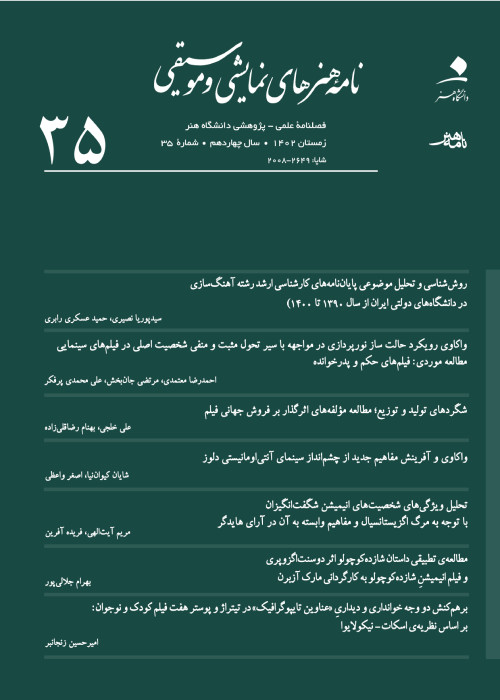Henry Bergson's Theory of Memory-Time and its Influence on Contemporary Iranian Cinema Narrative
Author(s):
Article Type:
Research/Original Article (دارای رتبه معتبر)
Abstract:
In this research, at the first step the concept of memory and time are explained from Bergson and Deleuzes perspective. Then the influences and changes caused by these ideas are explained as well. After that, it comes the analysis of some of contemporary Iranian films which have a modern narrative structure in order to formulate a single pattern for reading this kind of films.
Time as an experience of human life never has a steady sense for mankind. All the great thinkers and scientists have tried to find an answer for the big question time. In recent years, time and memory are favored topics among theoreticians and filmmakers. By having some of the most important ideas about these subjects in their minds, they focused on works which emphasis on the concept of time as an original experience in the process of observation. This point of view also can be traced in the serious works of Iranian cinema. In modern times, all the ideas about perception of time are influenced by Bergson and his followers ideas. Bergson did not believe in time as only a series of changes and alterations within the framework of an identity. He did not believe of moving in space as the best way of explaining time either. After Bergson, Gilles Deleuze continued the discussion about duration from his own stand point of view. He believes if the concept of durations be examined precisely, the result would be the fact that each part of time has its own moment and regarding its special way of happening has a unique quality, which makes it different from other moments. In the films influenced by Bergson and Deleuze ideas, narrative is based on the inner, subjective and qualified perception of time by the characters. As a result, narrative and all its elements alter in this kind of cinema. Film has an inevitable time cast and this time order imposes on the audience during the experience of watching film and the audiences cannot do anything to change the order and repetition of events. Most of the narrative process in film shaped by ordering and organizing the element of time. Many films have been made from a subjective point of view in Iranian cinema but only a few of them have memory of the past as their dominant theme. But in recent years, the production of these kind of films has increased and it shows the popularity of this perspective among Iranian filmmakers in recent years. In order to explain the result of research, four films have been selected because of their emphasis on concept of memory: The Pear Tree (Darush Mehjouie, 1996), Fathers farm (Rasoul Mollagholipor, 2002), Last Step (Ali Mosaffa, 2011) and The Yellow, Shallow Sky (Bahram Tavvakoli, 2012). In this research, after the analysis of contemporary philosophical ideas about memory-time and its influence on narrative in film, Iranian contemporary cinema has been analyzed from this stand point of view. This research aims at finding out how these kinds of films were successful to deliver these ideas.
Time as an experience of human life never has a steady sense for mankind. All the great thinkers and scientists have tried to find an answer for the big question time. In recent years, time and memory are favored topics among theoreticians and filmmakers. By having some of the most important ideas about these subjects in their minds, they focused on works which emphasis on the concept of time as an original experience in the process of observation. This point of view also can be traced in the serious works of Iranian cinema. In modern times, all the ideas about perception of time are influenced by Bergson and his followers ideas. Bergson did not believe in time as only a series of changes and alterations within the framework of an identity. He did not believe of moving in space as the best way of explaining time either. After Bergson, Gilles Deleuze continued the discussion about duration from his own stand point of view. He believes if the concept of durations be examined precisely, the result would be the fact that each part of time has its own moment and regarding its special way of happening has a unique quality, which makes it different from other moments. In the films influenced by Bergson and Deleuze ideas, narrative is based on the inner, subjective and qualified perception of time by the characters. As a result, narrative and all its elements alter in this kind of cinema. Film has an inevitable time cast and this time order imposes on the audience during the experience of watching film and the audiences cannot do anything to change the order and repetition of events. Most of the narrative process in film shaped by ordering and organizing the element of time. Many films have been made from a subjective point of view in Iranian cinema but only a few of them have memory of the past as their dominant theme. But in recent years, the production of these kind of films has increased and it shows the popularity of this perspective among Iranian filmmakers in recent years. In order to explain the result of research, four films have been selected because of their emphasis on concept of memory: The Pear Tree (Darush Mehjouie, 1996), Fathers farm (Rasoul Mollagholipor, 2002), Last Step (Ali Mosaffa, 2011) and The Yellow, Shallow Sky (Bahram Tavvakoli, 2012). In this research, after the analysis of contemporary philosophical ideas about memory-time and its influence on narrative in film, Iranian contemporary cinema has been analyzed from this stand point of view. This research aims at finding out how these kinds of films were successful to deliver these ideas.
Keywords:
Memory , Time , Narrative , Henry Bergson , Gilles Deleuze , Iranian Cinema
Language:
Persian
Published:
Journal of dramatic Arts and Music, Volume:8 Issue: 15, 2018
Pages:
55 to 72
magiran.com/p1805506
دانلود و مطالعه متن این مقاله با یکی از روشهای زیر امکان پذیر است:
اشتراک شخصی
با عضویت و پرداخت آنلاین حق اشتراک یکساله به مبلغ 1,390,000ريال میتوانید 70 عنوان مطلب دانلود کنید!
اشتراک سازمانی
به کتابخانه دانشگاه یا محل کار خود پیشنهاد کنید تا اشتراک سازمانی این پایگاه را برای دسترسی نامحدود همه کاربران به متن مطالب تهیه نمایند!
توجه!
- حق عضویت دریافتی صرف حمایت از نشریات عضو و نگهداری، تکمیل و توسعه مگیران میشود.
- پرداخت حق اشتراک و دانلود مقالات اجازه بازنشر آن در سایر رسانههای چاپی و دیجیتال را به کاربر نمیدهد.
دسترسی سراسری کاربران دانشگاه پیام نور!
اعضای هیئت علمی و دانشجویان دانشگاه پیام نور در سراسر کشور، در صورت ثبت نام با ایمیل دانشگاهی، تا پایان فروردین ماه 1403 به مقالات سایت دسترسی خواهند داشت!
In order to view content subscription is required
Personal subscription
Subscribe magiran.com for 70 € euros via PayPal and download 70 articles during a year.
Organization subscription
Please contact us to subscribe your university or library for unlimited access!



